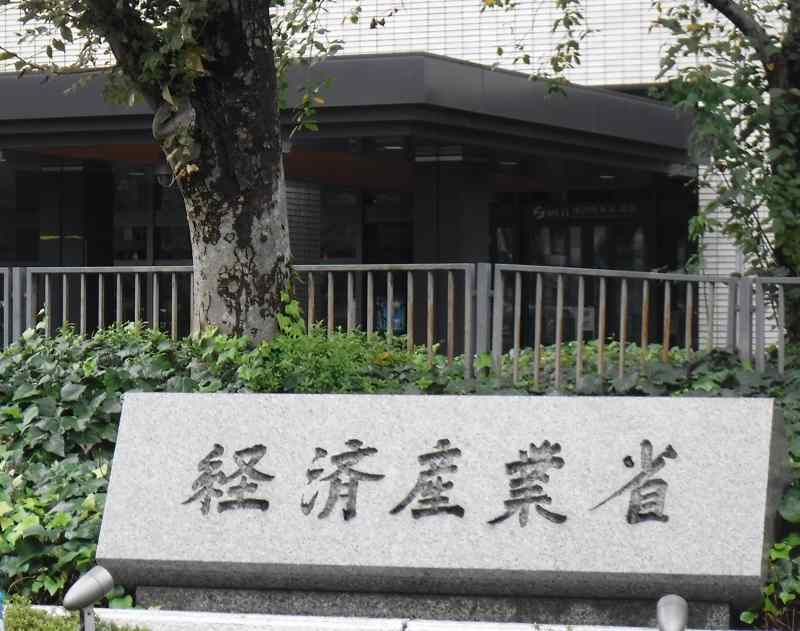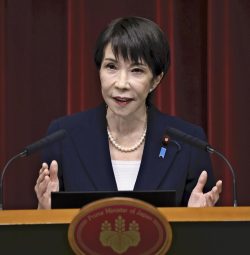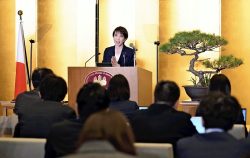
The Economy, Trade and Industry Ministry building
20:00 JST, June 7, 2022
The Economy, Trade and Industry Ministry has drafted a proposal to lift restrictions on sports betting, it has been learned. The move appears to be aimed at increasing revenues from broadcasting and advertising as part of efforts to boost the sports industry, but the proposal is expected to face strong opposition amid concerns that sports betting could lead to match-fixing and cases of gambling addiction.
At a press conference on Tuesday, industry minister Koichi Hagiuda said no moves were in place to realize such a proposal immediately.
As early as July, the industry ministry and the Sports Agency will reconvene the Sports Development Council for the first time in five years, to discuss lifting restrictions on sports betting.
In 2016, the council set a goal of expanding the size of the Japanese sports market from ¥5.5 trillion in 2015 to ¥15 trillion in 2025.
“We’ll resume discussions, taking into account changes in the structure of the global sports industry due to the COVID-19 pandemic and digitalization, but when to start the discussions and what to discuss is not yet decided,” Hagiuda said.
Gambling that is not publicly certified is prohibited in Japan. Betting on horse racing and track cycling, and sports lotteries are among some of the forms of gambling that are permitted under special laws.
Sports betting is hugely popular overseas, especially in Europe. Japan is the only Group of Seven nation in which sports gambling is broadly banned, according to the industry ministry.
Since the U.S. Supreme Court ruled in 2018 that a law banning betting was unconstitutional, sports gambling has been legalized in several states.
A recognition that American sports had become the target of foreign betting, resulting in a massive outflow of wealth, is thought to be behind the move. Japanese sports have also become targets, with some estimates indicating that revenues from foreign gambling are worth about ¥5 trillion-¥6 trillion annually.
In some countries, the types of things gamblers can bet on have diversified, with people able to place bets on not only the results of competitions, but also on the next play or action in the middle of a game.
However, concerns have been expressed that in-play betting could lead to match-fixing and an increase in gambling addiction.
On the other side of the argument are proposals to use some of the revenue that would be generated from gambling to promote local sports and to cover the costs of club activities at public junior high schools.
On Monday, Sports Agency Commissioner Koji Murofushi received a proposal on measures for shifting the operating bodies of extracurricular club activities from schools to private clubs and other entities.
“Sports betting is still a grey area in Japan, with no concrete design yet in place,” Murofushi told reporters. “The Sports Agency does not intend to use [revenue from] sports betting to cover the costs of the proposed reforms” of the outsourcing of school club activities.
Motohiro Ohashi of the Nagoya Zokei University of Art and Design said, “It would be outrageous if children’s club activities were used as the basis to promote the legalization of sports betting.”
“Central and local governments should properly allocate public funds if the sports activities are necessary for the education and healthy development of children,” Ohashi said.
Objections to sports betting have been raised in the world of professional baseball, which has developed into a national sport by strictly dealing with illegal practices and launching campaigns to eliminate organized crime.
Match-fixing and gambling are banned under the rules of the Professional Baseball Agreement. Baseball has also distanced itself from the Toto sports lottery operated by the Japan Sport Council.
In 2015, a nonpartisan association of sports-related lawmakers considered including professional baseball in the Toto sports lottery, but the plan did not receive the backing of the baseball industry.
Japan’s 12 professional baseball teams discussed the proposal following a subsequent request to reconsider the matter, but decided against it, according to a report of a 2018 owners’ meeting.
In professional soccer, where Toto is well established, the potential of legalized betting has been discussed as part of the sport’s growth strategy.
However, an industry source said, “It was concluded that legal issues and the challenge of gaining the public’s understanding would be too difficult to overcome.”
Toshio Takano, chief of the Japan Sumo Association’s crisis management committee, said, “If we’re talking about local support to ease the burden on teachers who have to work extra hours [on extracurricular club activities], I think there are other ways to secure financial resources without relying on betting.”
Top Articles in Politics
-

LDP Wins Historic Landslide Victory
-

LDP Wins Landslide Victory, Secures Single-party Majority; Ruling Coalition with JIP Poised to Secure Over 300 seats (UPDATE 1)
-

Japan Tourism Agency Calls for Strengthening Measures Against Overtourism
-

CRA Leadership Election Will Center on Party Rebuilding; Lower House Defeat Leaves Divisions among Former CDPJ, Komeito Members
-

Voters Using AI to Choose Candidates in Japan’s Upcoming General Election; ChatGPT, Other AI Services Found Providing Incorrect Information
JN ACCESS RANKING
-

Japan Institute to Use Domestic Commercial Optical Lattice Clock to Set Japan Standard Time
-

Israeli Ambassador to Japan Speaks about Japan’s Role in the Reconstruction of Gaza
-

Man Infected with Measles May Have Come in Contact with Many People in Tokyo, Went to Store, Restaurant Around When Symptoms Emerged
-

Prudential Life Insurance Plans to Fully Compensate for Damages Caused by Fraudulent Actions Without Waiting for Third-Party Committee Review
-

Woman with Measles Visited Hospital in Tokyo Multiple Times Before Being Diagnosed with Disease






















